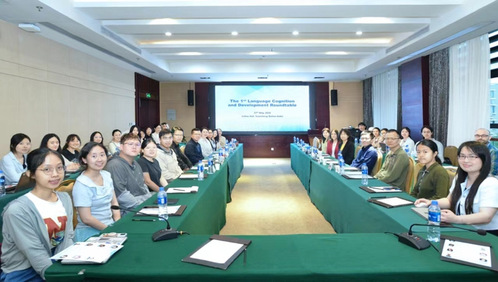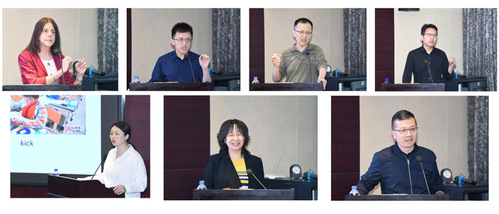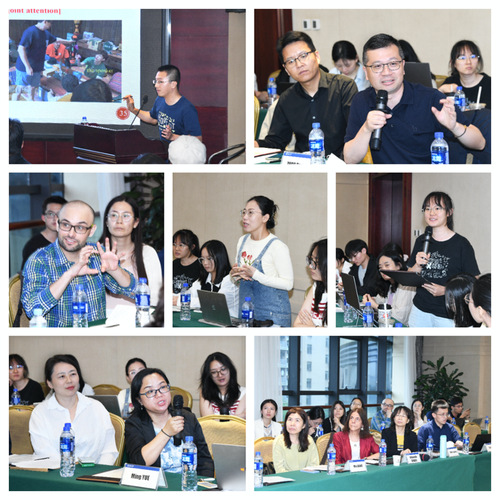On May 27, 2024, the 1st Language Cognition and Development Roundtable of the School of International Studies, Zhejiang University was successfully held at Qizhen Hotel, Zhejiang University. Over 40 students and teachers from various departments across the university participated in the forum. The event was organized by the School of International Studies at Zhejiang University and the Language Cognition and Development Laboratory of Zhejiang University. The opening ceremony was moderated by Prof. YANG Jing and ZHOU Peng from the School of International Studies. Prof. MIN Shangchao, Prof. WANG Min, and Prof. YUE Ming from the School of International Studies were also present. Following the opening ceremony, Prof. Antonella Sorace from the University of Edinburgh, Prof. CHEN Hui from the Department of Psychology and Behavioral Sciences, Prof. DING Nai from the College of Biomedical Engineering and Instrument Science, Prof. DONG Yanping, Dean of the School of International Studies, Prof. LI Xuping from the School of Literature, and Prof. YANG Jing and ZHOU Peng from the School of International Studies delivered insightful speeches.

Prof. Antonella Sorace presented a report titled “The Ecology of Bilingualism Across Generations,” discussing the factors influencing the changes in bilingual individuals’ two languages across intra-generational and inter-generational dimensions. With the example of subject pronoun usage, Prof. Sorace elaborated on the phenomenon of overgeneralization of explicit pronouns from the perspectives of language environment and individual differences, and pointed out that future research should focus more on the impact of first language attrition in the previous generation on intergenerational bilinguals.
Prof. DING Nai’s speech, titled “Encoding of Linguistic Constituents in Human Brain and Large Language Models,” delved into the representation of linguistic components in the brain from two aspects: low-frequency neural activities induced by human language and the behavior of chatGPT in reasoning tasks. The tasks used in the research were frequency tracking paradigms and tasks of rule inference based on word deletion. Prof. DING’s series of research results showed that both neurophysiological data from humans and behavioral data from large language models (LLM) support the internal representation of linguistic components in the process of language comprehension.

Prof. CHEN Hui’s speech, titled “Unveiling the Mechanisms of Information Selection: Insights from Typical and Atypical Cognitive Processing,” systematically introduced the team’s recent research progress on the relationship between attention and working memory. The team creatively adopted the attribute amnesia paradigm to separate attention and memory processes, discovering the phenomenon of attribute amnesia in various types of information such as letters, numbers, colors, faces, and poetry. Based on existing research, the team proposed a re-selection model of working memory for attended information.
Prof. LI Xuping delivered a speech titled “Gestures and Definiteness-Encoding in a Language Without Articles”. In an integration of theoretical and experimental linguistic methods, the research explores the accompanying situations of bare nouns (BPs) and demonstrative phrases (DemPs) with gestures in Chinese, a language without articles. The research reveals the function of nouns and demonstrative phrases in Chinese concerning reference tracking. It proposes a definiteness model based on joint attention in Chinese, emphasizing the features of BPs and DemPs in joint attention, which are further constrained by gestures.
Prof. DONG Yanping’s speeh, titled “Developmental Trends of the Effects of Language Experience and Cognitive Control,” introduced a series of fruitful research on the impact of language experience (represented by interpreting experience) on cognitive control. The research found that the relationship between the two is dynamically developing, with possible fluctuations but following a corresponding pattern. The complexity of interpreter advantage development may reflect the different focuses of interpreting trainees at different training stages. Prof. DONG pointed out the direction for future research, i.e., analyzing the specific needs or characteristics of language experience, viewing the relationship between language experience and cognitive control from a developmental perspective, and adopting appropriate measurement methods and tasks.
Prof. YANG Jing’s speech, titled “Neural Substrates of Action Verb Embodiment in First and Second Language,” introduced three continuous research results of the team in embodied language cognition. The first language research found that nouns with high motor salience are processed more similarly to typical verbs than atypical nouns. The L2 research found that the embodiment degree of the L1 is higher than that of the L2, and the embodiment degree of the L2 is influenced by different dimensions of L2 experience.
Prof. ZHOU Peng’s speech is titled “Continuity and discontinuity in language processing abilities between autistic and typically developing children”. With the visual scene search paradigm, Prof. ZHOU introduced experiments in three dimensions: lexical processing, morphological processing, and tone recognition. The results show that autistic children can use lexical, morphological, and syntactic information in the process of language comprehension. Although their understanding may not be as efficient as that of typically developing children, the core language processing abilities of autistic children show fundamentally no difference from those of their typically developing peers. The differences between the two groups of children mainly stem from their non-verbal cognitive abilities. Meanwhile, autistic children have significantly lower abilities in processing social pragmatic information (such as prosodic information) compared to typically developing children.

During this interdisciplinary exchange, the attending students and teachers not only discussed the research contents of the experts but also engaged in in-depth discussions on the significance and approaches of interdisciplinary research. Finally, Prof. DONG delivered the closing remarks, calling for more interdisciplinary and international collaborative research in the future.
Text: ZHUANG Bingyuan
Language Cognition and Development Laboratory, School of International Studies
Translated by JI Yan, proofread by XU Xueying



